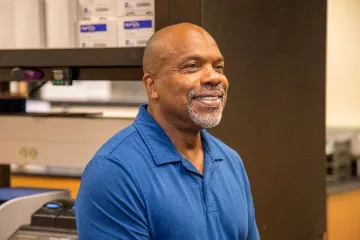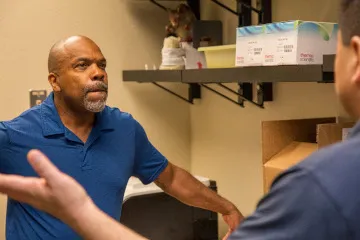From Innovation to Realization: A 'Liquid Biopsy' for the Cancer-Detection Toolkit

Mark A. Nelson, PhD (right), works with research scientist Marc Oshiro, PhD, who performs DNA amplification in a Thomas D. Boyer Liver Institute laboratory.
When Mark A. Nelson, PhD, came to the University of Arizona College of Medicine – Tucson in 1993, he was just launching his career. Now, he's launching a startup. He says his life's work has been leading up to this moment.
"My father always instilled in us to try to start a business at some point," he recalls. "It just took a while for the right combination of events and ideas to get to this point."

After completing his doctoral research investigating how genetic changes accumulate to turn healthy cells into tumor cells, he moved from Washington to Tucson for a postdoctoral fellowship at the UArizona Cancer Center. Tucson had its hooks in him.
Now a tenured professor of pathology, in 2019 Dr. Nelson partnered with Tech Launch Arizona (TLA) to bring together three decades of discoveries to co-found Precision Epigenomics, a startup that arose from a "liquid biopsy" developed across UArizona Health Sciences labs. He hopes this biopsy will someday be a helpful addition to the cancer-detection toolkit, alongside tissue biopsy, in which a sample of a suspected tumor is analyzed in the lab.
"Standard tissue biopsy is invasive, with some pain and some risk," he says. "A liquid biopsy uses a biofluid, such as blood or urine, to identify cancer. It is minimally invasive, it can be easier to obtain, it can provide a more comprehensive profile of a tumor, and there is minimal pain and risk associated with it."
Liquid biopsies are relatively new technology, and only a handful have been approved by the FDA so far. Precision Epigenomics' liquid biopsy, called Sentinel-10TM, was developed with co-founder Bernard Futscher, PhD, retired professor at the UArizona R. Ken Coit College of Pharmacy, and Lukas Vrba, PhD, former UArizona Cancer Center research scientist. Sentinel-10TM is a multi-cancer detection test currently in clinical trials to evaluate its capability of identifying more than 20 different cancer types.
"We have validated the ability of our tests to detect non-small cell lung cancer, breast cancer, pancreatic cancers, as well as several other cancer types," he says.
On the lookout for cancer's chemical signatures
The DNA of cancer cells has unique chemical signatures that differentiate them from normal cells. As cancer cells grow, pieces break off and circulate in the bloodstream. A liquid biopsy can identify those pieces, using their chemical signatures as biomarkers. Precision Epigenomics' research team has identified these chemical signatures in several cancer types in their ongoing clinical studies.

In collaboration with several UArizona Health Sciences investigators, Dr. Nelson and his research team are evaluating the clinical utility of Sentinel-10TM.
"There are only a handful of cancers that have screening — breast cancer, lung cancer, cervical cancer, prostate cancer," he says. "Liquid biopsy has the potential to increase the number of cancers that can be screened. There's opportunity for improving diagnosis of disease."
By taking a closer look at our bodies' signals, he also believes liquid biopsy has potential beyond early cancer diagnosis. For example, it could help doctors decide which therapies will work best against a patient's particular cancer type or monitor a patient's response to treatment. It might even be used to observe an organ transplant recipient to catch early signs that the transplant is in danger of being rejected.
Addressing disparities
For Dr. Nelson, these possibilities are exciting. He also hopes the technology will play a role in addressing cancer disparities — cancers that disproportionately burden certain racial or ethnic groups. Computer analysis of The Cancer Genome Atlas (TCGA) database have already shown Sentinel-10's potential to be effective across racial lines, and he plans to test its capabilities in real-world populations, including in collaboration with other College of Medicine – Tucson researchers.

"We have several clinical studies in progress with the Thomas D. Boyer Liver Institute, looking at the ability of our markers to detect liver cancer," he says. "Liver cancer is on the rise in the United States, and here in Southern Arizona disproportionately higher incidence occurs in Hispanic and Native American individuals."
Beyond Arizona, Dr. Nelson plans to collaborate with cancer centers across the country to test Sentinel-10's performance in detecting other cancers in populations affected by disparities. His hope is that, if Sentinel-10TM proves effective, it will make cancer testing more accessible to a greater number of people.
"I think liquid biopsy could help impact and reduce some disparities in early cancer detection, if properly employed," he says. "There is a lot that goes into cancer disparities besides just access to care. A lot of liquid biopsies aren't covered by insurance right now. We need to have tests that are affordable and covered by insurance."
Launching a startup
Dr. Nelson and his co-inventors first brought the discovery to TLA, the UArizona office that commercializes research-based inventions, in 2016. In the intervening years, TLA provided services and resources to help the team protect and refine the intellectual property for the invention, create a business strategy and build a leadership team.
The team took a big step on their journey when they entered a pitch competition in 2020 sponsored by the town of Sahuarita and Freeport McMoRan — and won. That victory provided funding, and Precision Epigenomics was born, with additional support from TLA along with the University of Arizona Center for Innovation and a National Cancer Institute Small Business Innovation Research grant.

Dr. Nelson says the support the project has received has been validating.
"That's a nice feeling of satisfaction, even verification, that you're on the right track," he says. "That's been a good feeling. It's fun and exciting!"
Precision Epigenomics is currently setting up a laboratory on Alvernon Way, just three miles east of campus, and the team is already conducting Phase II clinical trials to evaluate Sentinel-10's efficacy in a small group of study participants.
"We've been fortunate as a young startup company. We have a multitalented executive team, a collaborative team of both bench scientists and clinical colleagues, and medical infrastructure to do these studies," he says. "Coming up with a concept and being able to go all the way from innovation to something that's realized has been pretty rewarding."
For Dr. Nelson, everything he's done throughout his career is coming together, and he's looking forward to what happens next.
"It's been a long journey, with its ups and downs, but we have a lot of momentum right now," he says. "We're at the point where this technology is going to be able to help people in the very near future."
Precision Epigenomics, Inc., is a College of Medicine – Tucson Department of Pathology, R. Ken Coit College of Pharmacy, and UArizona Cancer Center spinoff committed to launching new molecular diagnostic tests for cancer patients. The executive team consists of Vice President Richard Bernert, MD; Medical Director Joshua Routh, MD; Chief Financial Officer Matt Miller, CPA; Controller Jody Yarbrough, CPA; and Chief Business Officer Audrey Ozols, MBA. Dr. Nelson and his research team (Marc Oshiro, PhD, Boyer Liver Institute research scientist; George Watts, PhD, associate research professor of pharmacology; and Drs. Futscher and Vrba) are engaged in collaborations at the College of Medicine – Tucson with Billie Bixby, MD, clinical assistant professor of medicine; Geoffrey Block, MD, MSc, FACP, director of the Boyer Liver Institute; Linda Garland, MD, professor of medicine; and Gregory Woodhead, MD, PhD, assistant professor of medical imaging; and at the UArizona College of Medicine – Phoenix with Lisa Jarnagin, MD, assistant clinical professor of internal medicine; Ken Knox, MD, professor of internal medicine; Wahid Wassef, MD, chief of the Division of Gastroenterology and Hepatology; and Raed Alalawi, MD, associate clinical professor of internal medicine.
Contacts
Anna C. Christensen

